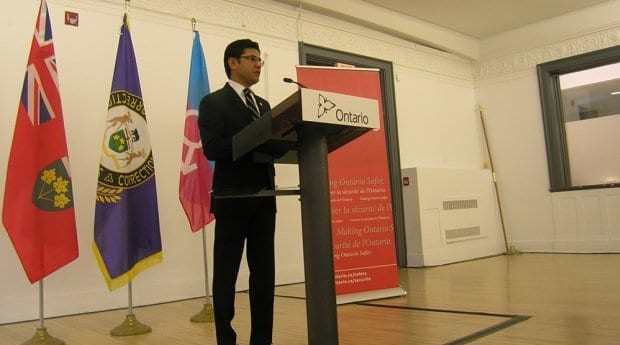A sweeping overhaul to the admittance and placement policies for trans inmates at Ontario’s jails and prisons has put the province ahead of many other jurisdictions, according to the minister of community safety and correctional services. But do the reforms go far enough?
Officials at Ontario’s detention and correctional centres will now have to place trans inmates based on their self-identified gender, rather than by what a prison guard perceives their gender to be. Integration into the general prison population will also be favoured over segregation.
At a press conference at the 519 Church Street Community Centre on Jan 26, Yasir Naqvi, Ontario’s community safety minister, announced a new set of policies aimed at respecting the rights of trans inmates.
“This is the most progressive policy on the treatment of trans inmates in North America,” Naqvi says. “No other jurisdiction in Canada has such policy.” He says he will be sending a copy of the policy to his counterparts across the country.
Inmates can also choose the gender of the officer who will perform both a frisk and strip search or choose to have two officers present. Prior to the new policies being put in place, that option was available only for strip searches.
The new process also allows inmates to have input into how the searches are done so that they are performed respectfully; however, Naqvi did not elaborate on how much input inmates would have beyond choosing the gender of the officer who would perform the search. And while the new measures extend to the general prison population, the onus is on inmates themselves to speak up.
“It’s up to the individual to identify their gender,” Naqvi says. “We will respect their self-identification; we will respect their given name; we will respect their personal pronoun.”
Placement decisions will be made by multidisciplinary teams, which will include health and social workers. Training on trans issues is already being developed for ministry staff.
The previous policy, which allowed ministry officials some discretion in placing trans inmates, was criticized for being inaccessible and unclear. The cases of Avery Edison and Boyd Kodak, who were both misgendered and placed in detention centres that didn’t match their gender identities, also demonstrated just how arbitrary the policy was.
In February 2014, Edison, a British trans woman and comedian, was detained over an apparent immigration issue and was sent to a men’s detention centre, even though her passport listed her gender as female. It wasn’t until her story made national news that she was switched to a woman’s prison before being deported back to the United Kingdom.
Kodak found himself in a similar situation after he was arrested in 2012. He described a humiliating search process when he was sent to a women’s detention centre, despite having long identified as a man. “My prosthesis was removed, it was examined and passed around in front of me, and then it was confiscated,” he says. Kodak was forced to wear women’s clothing and was later released with only women’s clothes.
“I was put in harm’s way,” Kodak says.
Kodak and Edison filed separate complaints with the Human Rights Tribunal of Ontario (Edison also filed a complaint with the Canadian Human Rights Commission).
Naqvi told reporters that he could not speak to any specific cases but said that, because of Toby’s Act, he wanted to work to make sure that policies were put in place to protect the rights of trans inmates. (In 2012, the Ontario legislature passed Toby’s Act, which added gender identity and expression as grounds for discrimination to the Ontario Human Rights Code.)
While Kodak was pleased with some of the steps taken by the Ontario government, he remains concerned that both his case and Edison’s remain unsettled. He says that if the Ontario government wants to be sincere about respecting the rights of trans inmates, it should resolve both of these cases. “That would be, to me, a real resolution.”
According to Naqvi, some of the new policies are already being implemented in Ontario prisons. He couldn’t provide information on how many trans people already in the Ontario prison system this would affect, but many of the new policies will have an impact on the general population.
HG Watson can be reached at hg.watson@dailyxtra.com or @hg_watson on Twitter.


 Why you can trust Xtra
Why you can trust Xtra


